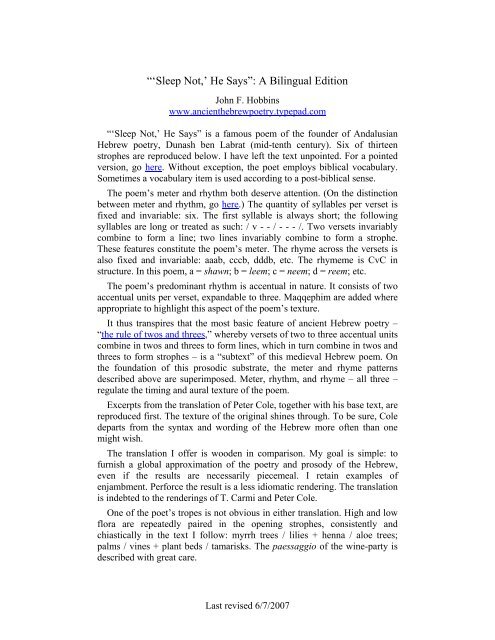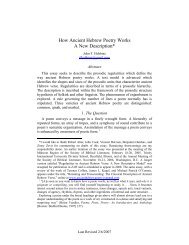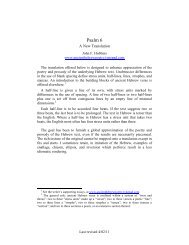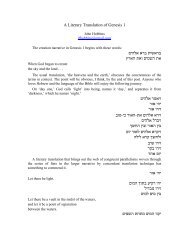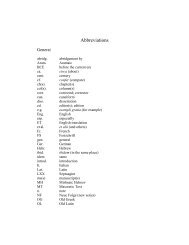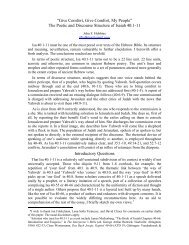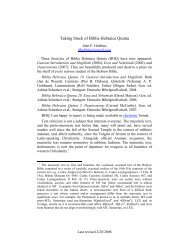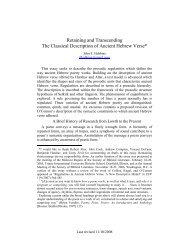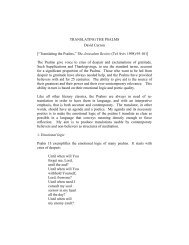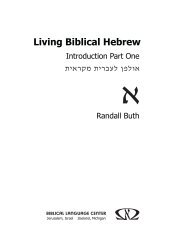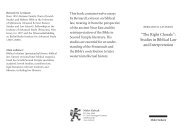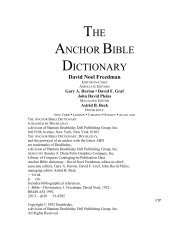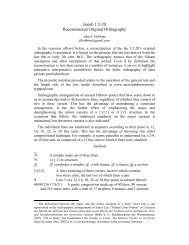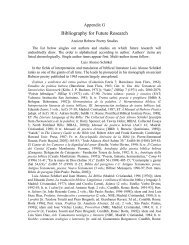Dunash ben Labrat - Ancient Hebrew Poetry - Typepad
Dunash ben Labrat - Ancient Hebrew Poetry - Typepad
Dunash ben Labrat - Ancient Hebrew Poetry - Typepad
Create successful ePaper yourself
Turn your PDF publications into a flip-book with our unique Google optimized e-Paper software.
“‘Sleep Not,’ He Says”: A Bilingual Edition<br />
John F. Hobbins<br />
www.ancienthebrewpoetry.typepad.com<br />
“‘Sleep Not,’ He Says” is a famous poem of the founder of Andalusian<br />
<strong>Hebrew</strong> poetry, <strong>Dunash</strong> <strong>ben</strong> <strong>Labrat</strong> (mid-tenth century). Six of thirteen<br />
strophes are reproduced below. I have left the text unpointed. For a pointed<br />
version, go here. Without exception, the poet employs biblical vocabulary.<br />
Sometimes a vocabulary item is used according to a post-biblical sense.<br />
The poem’s meter and rhythm both deserve attention. (On the distinction<br />
between meter and rhythm, go here.) The quantity of syllables per verset is<br />
fixed and invariable: six. The first syllable is always short; the following<br />
syllables are long or treated as such: / v - - / - - - /. Two versets invariably<br />
combine to form a line; two lines invariably combine to form a strophe.<br />
These features constitute the poem’s meter. The rhyme across the versets is<br />
also fixed and invariable: aaab, cccb, dddb, etc. The rhymeme is CvC in<br />
structure. In this poem, a = shawn; b = leem; c = neem; d = reem; etc.<br />
The poem’s predominant rhythm is accentual in nature. It consists of two<br />
accentual units per verset, expandable to three. Maqqephim are added where<br />
appropriate to highlight this aspect of the poem’s texture.<br />
It thus transpires that the most basic feature of ancient <strong>Hebrew</strong> poetry –<br />
“the rule of twos and threes,” whereby versets of two to three accentual units<br />
combine in twos and threes to form lines, which in turn combine in twos and<br />
threes to form strophes – is a “subtext” of this medieval <strong>Hebrew</strong> poem. On<br />
the foundation of this prosodic substrate, the meter and rhyme patterns<br />
described above are superimposed. Meter, rhythm, and rhyme – all three –<br />
regulate the timing and aural texture of the poem.<br />
Excerpts from the translation of Peter Cole, together with his base text, are<br />
reproduced first. The texture of the original shines through. To be sure, Cole<br />
departs from the syntax and wording of the <strong>Hebrew</strong> more often than one<br />
might wish.<br />
The translation I offer is wooden in comparison. My goal is simple: to<br />
furnish a global approximation of the poetry and prosody of the <strong>Hebrew</strong>,<br />
even if the results are necessarily piecemeal. I retain examples of<br />
enjambment. Perforce the result is a less idiomatic rendering. The translation<br />
is indebted to the renderings of T. Carmi and Peter Cole.<br />
One of the poet’s tropes is not obvious in either translation. High and low<br />
flora are repeatedly paired in the opening strophes, consistently and<br />
chiastically in the text I follow: myrrh trees / lilies + henna / aloe trees;<br />
palms / vines + plant beds / tamarisks. The paessaggio of the wine-party is<br />
described with great care.<br />
Last revised 6/7/2007
Drink, He Said [strophes 1-3, 9-10, 13]<br />
“Drink,” he said, “don’t drowse,<br />
drink wine aged well in barrels,<br />
near henna beds and aloes<br />
and roses mixed with myrrh-<br />
in pomegranate groves<br />
by grapevines and date palms<br />
with tender plants and saplings<br />
and tamarisks in rows<br />
To the sound of coursing water,<br />
the thrumming of the zither<br />
accompanies the singers<br />
with reed-pipes and an oud.<br />
* * *<br />
Anointed then with oil<br />
we’ll burn fragrant scents-<br />
and before destruction’s hour,<br />
live our lives in bliss.”<br />
“Silence!” I rebuked him.<br />
“How could you propose this?<br />
The Temple and God’s footstool<br />
are held by unclean hands.<br />
* * *<br />
How could we drink wine<br />
or even raise our eyeswhile<br />
we, now, are nothing,<br />
detested and despised?”<br />
ואומר אל תישן<br />
ואומר אל־תישן<br />
שתה יין ישן<br />
וכפר עם־שושן<br />
ומר עם־אהלים<br />
בפרדס רמונים<br />
ותמר וגפנים<br />
ונטעי נעמנים<br />
ומיני האשלים<br />
ורגש צנורים<br />
והמית כנורים<br />
עלי־פה השרים<br />
במנים ונבלים<br />
* * *<br />
ונמשח שמן טוב<br />
ונקטיר עץ רטוב<br />
בטרם יום קטוב<br />
יבואנו נשלים<br />
גערתיהו דם דם<br />
עלי־זאת איך תקדם<br />
* * *<br />
ובית קדש והדום<br />
אלהים לערלים<br />
ואיך נשתה יין<br />
ואיך נרים עין<br />
והיינו אין<br />
מאוסים וגעולים<br />
[Translation by Peter Cole,<br />
The Dream of the Poem<br />
(Princeton, 2007) 24-25.]
“Sleep Not,” He Says [1-3, 9-10, 13]<br />
“Sleep not,” he says,<br />
“but drink well aged wine,<br />
by myrrh trees with lilies<br />
near henna and aloes-<br />
in a grove of pomegranates,<br />
grapevines and palms,<br />
delightful beds of plants<br />
and tamarisks in rows -<br />
to the splash of fountains<br />
and the strum of lyres,<br />
to the sound of singers<br />
with strings and harps.<br />
* * *<br />
With fine oil we’ll smear ourselves<br />
and burn fragrant scents;<br />
before the day of doom<br />
o’er us comes, fare well we will.”<br />
“Silence!” I rebuked him.<br />
“How can you so propose<br />
while the temple and the footstool<br />
of God the uncircumcised hold?<br />
* * *<br />
How can we drink wine,<br />
how can we raise our eyes,<br />
while we are nothing,<br />
detested and despised?”<br />
[Translation by John Hobbins.<br />
Indebted to: Peter Cole,<br />
The Dream of the Poem<br />
(Princeton, 2007) 24-25, 362-363.]<br />
ואומר אל תישן<br />
ואומר אל־תישן<br />
שתה יין ישן<br />
עלי־מר עם־שושן<br />
וכפר ואהלים<br />
בפרדס רמונים<br />
ותמר וגפנים<br />
ונטעי נעמנים<br />
ומיני האשלים<br />
ורגש צנורים<br />
והמית כנורים<br />
עלי־פה השרים<br />
במנים ונבלים<br />
* * *<br />
ונמשח שמן טוב<br />
ונקטיר עץ רטוב<br />
בטרם יום קטוב<br />
יבואנו נשלים<br />
גערתיהו דם דם<br />
עלי־זאת איך תקדם<br />
ובית קדש והדום<br />
אלהים לערלים<br />
* * *<br />
ואיך נשתה יין<br />
ואיך נרים עין<br />
והיינו אין<br />
מאוסים וגעולים<br />
Text of Strophe 1b<br />
as in T. Carmi, The Penguin<br />
Bookof <strong>Hebrew</strong> Verse<br />
(Harmondsworth, 1981) 280.


